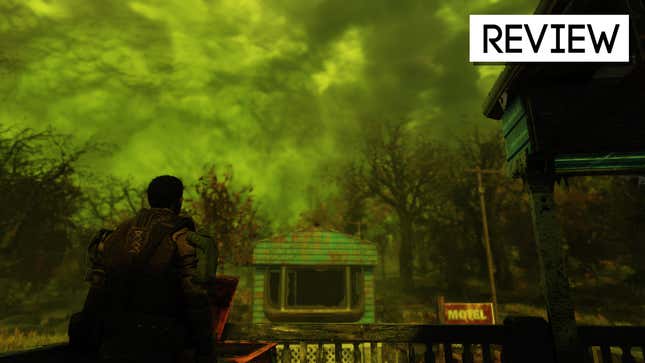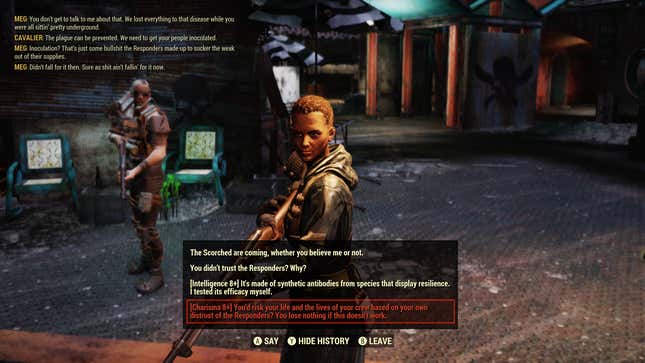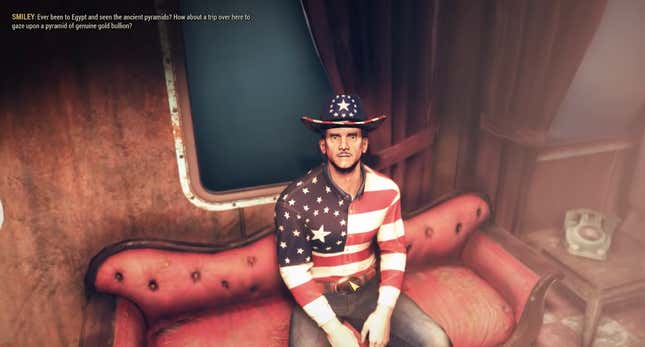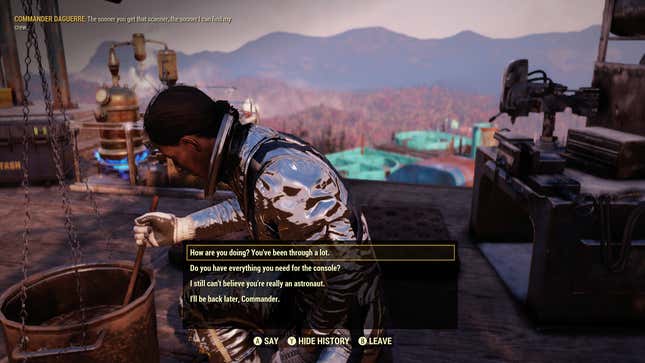
Fallout 76 is an incredibly frustrating game. Its combat feels like trying to unseize an overheated engine by hand. Bugs and occasional game crashes, though much rarer than at launch, remain ever present. Fallout 76 demands a lot of you if you just want to survive, and a ton more if you want to flourish in its fallen world. Throughout all of this, you can never quite shake the sense that there is something worth uncovering beneath all of the post-apocalyptic wreckage. Wastelanders, the game’s first major expansion, is no different. It adds a ton of new stuff to do and collect that mostly just serves to obscure its few interesting characters and quests.
The Wastelanders expansion, released earlier this month, adds NPC companions with their own quests, an entirely new loot economy, and some new areas to explore. There are more waypoints on the map than ever, and I was routinely bombarded by new optional timed missions. Small surprises, like learning something interesting about a new character or stumbling onto a stranger in the woods, are more rewarding but much fewer and farther between.
One of the criticisms lobbed at Fallout 76 after it first came out was how desolate and lonely its world felt. It was an online multiplayer game that could only support up to 12 players on the map at a time. While its mini-recreation of West Virginia was filled with mutants and monsters, the only trace of other humans not controlled by players was in the audio logs they’d left behind. These stories were sometimes ordinary, sometimes comedic, but always underscored by a vibrant streak of melancholy. The people whose problems you were hearing about were long gone. The most you could do was lay their remains to rest or satisfy one of the bullet points on their last will and testament.
Wastelanders attempts to answer that critique by bringing humans back to Appalachia and making Fallout 76 feel more like its single-player predecessors. It does this chiefly by giving you NPCs with plenty of new problems to solve. While some NPCs provide individual, interesting quests, mostly the new content revolves around completing the necessary fetch quests to break into a newly discovered Vault 79 believed to be full of gold. Settlers and raiders are warring over the vault. The former are hardworking tradespeople trying to create a new society; the latter are thieves and cutthroats hiding out in a crashed space station up north and pillaging from everyone else. You can befriend both groups, help them prepare a heist to steal the vault’s treasure, and eventually pick sides over how the loot gets dolled out.

While both factions represent a different vision for how to rebuild Appalachia, how you interact with them doesn’t meaningfully alter the course of the game. Instead, it slowly fills up faction reputation meters, which can eventually be used to buy better gear for surviving out in the Wasteland. Many of the game’s long awaited NPCs are just glorified task masters for you to submit weekly time sheets to. Players understood this to be a raw deal when the quest givers in the base game were robots. That they are now made of flesh and have dialogue trees doesn’t change the fact that much of Wastelanders is still predicated on keeping the player at arm’s length. This commitment to stasis is understandable considering Fallout 76 is an online game where players must share the same game world, but the fact that nothing you do changes the shape or mood of it in noticable ways takes a lot of the blood out of who you decide to help and why.
Conversations are often accompanied by a new set of skill checks. To pursue a certain dialogue option, you might need +4 charisma or +8 intelligence. Not only are these high bars for newer players—Wastelanders content opens up at level 20—they’re also hard to meet for players who have spent the last year pursuing other stat builds. If you’re able to satisfy one of these checks, you’re rarely rewarded with a more interesting branch of the conversation that’s catered to the traits you’ve chosen for your character. Instead, the reward is simply less busy work.
For instance, early on you need to activate a giant earth mover to try to tunnel into Vault 79. The device, called Motherlode, is under the control of Penelope, widow to the region’s late industrial tycoon Daniel Hornwright. Having long since become a ghoul as a result of prolonged exposure to radiation, Penelope’s worried that the new world order you’re trying to build won’t have room for mutants like her. Passing a +4 charisma check with her halfway through the quest doesn’t open up new doors or gain her trust. Instead, it reminds her that there’s a quicker way to fix the Motherlode than she’d previously thought. Pass the +8 intelligence check and you can convince her to use a toothbrush to clean the corrosion around some of the broken parts instead of needing to go hunt for a replacement part. Despite the quality voice acting and tragic backstory, you might as well be trying to hack one of the hundreds of computer terminals scattered elsewhere around the world. I feel for Penelope. I wish we could share more than just a to-do list.
The expansion’s quests don’t feel like you’re helping to shape the future or aiding the people who are going to live in it, so much as improve your own personal fortunes. This is most apparent than in the game’s new gold-based economy. Vault 79’s wealth can be used to back a new universal currency that, according to the logic of the Vault 76 Overseer, will cut down on bartering, trading, and the hostile cartels that spring up around these activities, bringing law and order back to the Wasteland. Some characters are planning a security force of sorts, which could perhaps shepherd Appalachia’s residents out of their nuclear winter into a new era of free market capitalism. If Wastelanders has any commentary on this twisted notion, it’s well hidden, only occasionally spilling out through the cracks in its new gold-based grind.
Once you’ve cracked open the vault, the end game is an interminable cycle of toil around amassing gold bullion. You earn the ability to earn bullion by completing some story quests but mostly from repeatable daily and public quests. Gold bullion can be traded with vendors for the plans to create things like electrical shock gauntlets, new power armor, or movable garden beds so you can grow crops anywhere you want. To unlock the opportunity to buy these plans, you need to level up your reputation with the faction the vendor belongs to by completing their daily quests, i.e., going out and killing stuff. Then you need to collect treasury notes, which can be exchanged for gold bullion at each faction camp, up to a certain amount each day. Of course, even when you’re able to eventually buy the plans, you still need to have scavenged for enough crafting materials to build them. It’s an arduous process that can only culminate in having some cool stuff to show off to NPCs who don’t give a shit.

Wastelanders hasn’t gotten rid of Fallout 76’s other players, of course. They and their camps are still around, with exceptions for a handful of isolated rooms where key story moments unfold that are separate for each individual player. The expansion hasn’t done anything to break down the barriers between players that have existed since the game came out. Players still can’t build together, create factions of their own, or easily communicate with one another across the map. This hasn’t stopped many from creating their own elaborate role-playing guilds and coordinating offline, but Wastelanders does nothing to reward that type of passion and creativity. Instead it offers computer-controlled characters who lack the agency needed to surprise you and only rarely have the sorts of backstories that make that trade-off worth it.
One of the most important post-release additions to Fallout 76 was vending machines. Players could put them up at their campsites, fill them with their extra loot, and sell it to players wandering by. It created a reason for players to go out of their way to interact with one another, showing up on the map as little green icons to facilitate meetups. It also encouraged players to build their camps near high trafficked areas or just outside key dungeons, acting as respites for weary travelers and creating a sense of community even for those who prefer to mostly play alone. Wastelanders introduces no similar invention.

There are glimmers of something special in the expansion. New companion quests allow you to bring an NPC back to your camp and help them on their own journey. After rescuing Commander Sofia Daguerre, an astronaut who mysteriously fell out of the sky after spending decades in cryosleep, she set up shop at my place while hunting for clues about what happened to the rest of her crew. Her questline is long and filled with busy work, but it results in some interesting revelations that allow for equally interesting choices. The relationship I created with her won’t change the trajectory of the Wasteland, but it did give me a deeper connection to it.
Sofia’s story is the best example of a Fallout 76 audiolog brought to life in Wastelanders, one in which government conspiracy, corporate greed, and human exploitation come together to produce both personal pain and the opportunity to help alleviate it. That my sobering conversations with Sofia as we pieced together her true backstory took place in my personal shack overlooking the valley below as a nuclear bomb went off in the distance only made it feel more personal. Where other Wastelanders NPCs offer to make the world feel less lonely by keeping you busy trying to optimize your productivity, she manages to do it by eliciting my empathy and sharing her emotional burdens. Where a game-as-service like Fallout 76 has a vested interest in making me struggle in perpetuity, it was a relief to feel like that chapter in our relationship had a beginning, middle and end. She didn’t give me any gold bullion, and there were no meters to keep filling up.
The same can’t be said for the rest of Wastelanders, which largely replaces one grind with another, albeit a more streamlined one with some human faces and voices to propel you through it. Wastelanders heightens Fallout 76’s contradictions between being a single-player open world and MMO loot chase. It’s been just 26 years since the bombs fell in Fallout 76’s fictional world, and West Virginia is only just starting to rebuild, but Wastelanders isn’t the fresh start I was hoping for.





